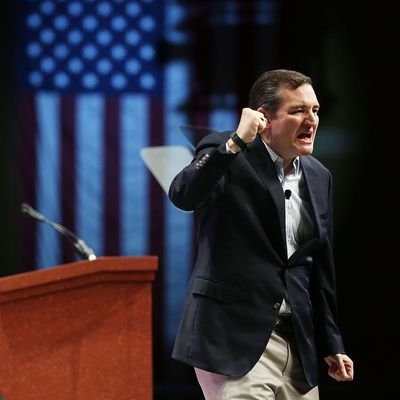
At the beginning of this year — back when the notion that Donald Trump might dominate the presidential race was a dystopian scenario as unimaginably remote as The Man in the High Castle — the most horrifying thing Republican insiders could imagine was a Ted Cruz nomination. In much the same way that Trump has set the terms of the presidential debate in ways that discomfited the party’s leadership and fired up the base, Cruz did the same in Washington. The intense loathing Cruz inspired among every professional Republican politician not named Ted Cruz made his nomination difficult to fathom. But the rise of Trump has changed many things, and one of them may be to grant Republican insiders a new perspective on just what unacceptable means.
The centrality of Trump has framed the Republican campaign as a binary question of Trump against whichever contender emerges as the non-Trump. Instead, the race may well be condensing into a three-way contest between Trump, Marco Rubio, and Cruz. Ben Carson, who has previously absorbed a large share of the Evangelical vote, has swiftly declined, allowing Cruz to rise into the top tier. One recent poll had him leading in Iowa, though others have shown Trump still ahead.
Cruz began the race isolated on the party’s right flank. Juxtaposed against Trump and Rubio, though, he could position himself roughly in the party’s center. To be sure, a case could be made to cast any of the three as the “moderate” or as the “extremist.” On foreign policy, Rubio has taken a rigidly neoconservative stance, and Cruz a more dovish one, with Trump too incoherent to be categorized at all. On social policy, Trump has outflanked the others to the right on xenophobic hatred, but to the left on abortion (Cruz and Rubio would ban all abortion, even in cases of rape and incest; Trump would make exceptions for those cases). On fiscal policy, all three candidates favor staggeringly large, regressive, debt-financed tax cuts and Obamacare repeal. All three have questioned climate science and oppose any efforts to limit carbon emissions.
Policy offers an inconclusive basis to compare the candidates, especially when one of the candidates makes up his policies on the fly. The candidates are easier to order on two other dimensions: their fealty to the base versus the Establishment, and their xenophobia. The two measures are somewhat related. Immigration policy, and openness to ethnic minorities, is the issue that most starkly divides the Republican Establishment from the grassroots. Rubio is the candidate who laid his credibility on the line in order to resolve the party’s immigration problem in 2013. (While he failed, and abandoned his own proposal, pro-reform Republicans have every reason to believe his heart lies with them.) Trump is the candidate whose inflammatory racism would brand the GOP as irrevocably hostile to immigrant communities. Cruz lies in between, not having sponsored major pro-reform legislation, but also having steered clear of crude Trumpist demagoguery (and, like Rubio, having a Cuban-American background to fall back upon).
Cruz may find himself best positioned to bridge the gap, and well positioned to win a three-way race divided along these lines. Should Trump falter, pro-Trump border hawks would probably prefer Cruz to Rubio, who tried to shepherd immigration reform through the Senate. And should Rubio falter, Rubio’s supporters would find Cruz a more predictable and disciplined Republican partisan than the erratic Trump.
Of course, this very thing is the sticking point with Cruz — just how reliable a partisan is he? He has certainly driven his fellow Republicans to distraction. But there is a method to Cruz’s madness. Cruz’s game is to exploit the base’s anger at the fact that the Republican majority in Congress lacks the constitutional power to bend President Obama to its will. Millions of conservative activists fail to understand why the veto power prevents Republicans from abolishing Obamacare, defunding Planned Parenthood, or otherwise carrying on as though they have unfettered power. This lack of understanding by their voters poses the single largest annoyance to elected Republicans. Cruz knows better, and Republicans in Washington know he knows better, which makes Cruz’s repeated insistence that Republicans who refuse to follow his doomed kamikaze missions must lack conviction an intolerable lie. (It is often forgotten that Rubio also supported the ridiculously ill-conceived 2013 anti-Obamacare government shutdown; but Rubio, unlike Cruz, refrained from attacking Republicans who didn’t endorse it, making his position forgivable.)
But Cruz’s demagoguery is specific to a certain set of conditions — a world in which Republicans control Congress but not the White House — that by definition would not apply if Cruz won the White House. Unlike Trump, a bona fide free agent, Cruz has given his party no reason to doubt his convictions. If elected, a Cruz presidency would be functionally identical to a Rubio presidency. He would sign the most conservative fiscal and regulatory legislation that could make it through Congress, and appoint reliable movement conservative to the judiciary. Cruz would have more leeway to direct foreign policy, but he might, if anything, steer a more cautious path than Rubio.
All this is to say that Cruz’s irritating demagoguery has given him a reputation as a right-wing flamethrower somewhat out of proportion to his actual policy stances, which differ from those of other Republicans primarily on the margins. His party’s distrust rises in part from personal (and, hence, not entirely rational) considerations. Washington Republicans despise Cruz, but they could learn to live with him, and it’s entirely possible that they will need to do just that.






























